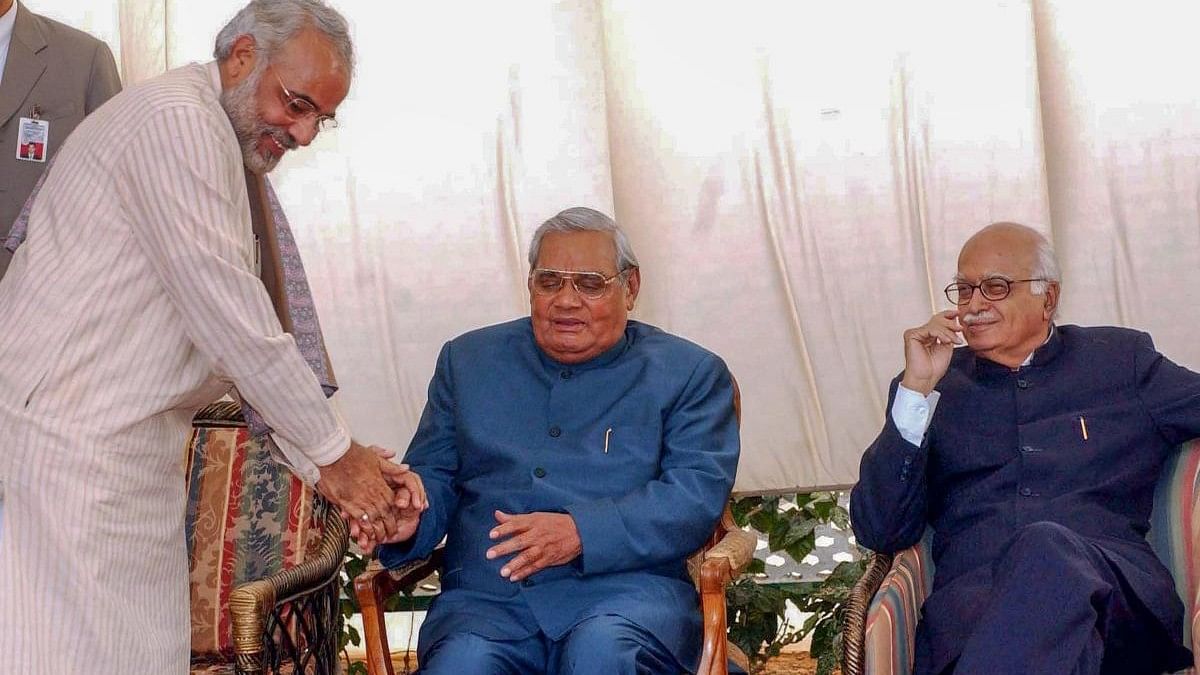
File photo of former PM Atal Bihari Vajpayee is seen with the then Gujarat CM Narendra Modi and BJP senior leader LK Advani
Credit: PTI Photo
New Delhi: Prime Minister Atal Bihari Vajpayee wanted to record his dissent when the BJP Parliamentary Board overwhelmingly rejected his demand for removal of Narendra Modi as Gujarat Chief Minister over Gujarat riots, a new biography of former Vice President M Venkaiah Naidu says.
However, Venkaiah Naidu: A Life in Service by S Nagesh Kumar says, Naidu’s gentle persuasion led to Vajpayee not recording his dissent officially.
The book, which was released by Prime Minister Modi on Sunday, recalls the political developments following Gujarat riots and said that the BJP top brass stood behind Modi though Vajpayee, who was 'holidaying at Manali' thought otherwise. BJP leadership was of the view that removal of Modi would mean a “permanent blot” on the party and “acceptance of guilt”.
Naidu was requested to rush to Manali to meet Vajpayee, who had by then told the media that Modi should have followed the path of ‘raj dharma’, and personally explain the “mood” in the party in favour of retaining Modi.
As party chief, Naidu stood firmly by Modi during this crisis and the 130-member National Executive at Mumbai had endorsed this stand. In Manali where he met Vajpayee, Naidu told the media that there was no question of seeking his resignation.
“When Vajpayee returned to Delhi, he (told) Naidu…that he wanted to express his views at a party forum, ‘kya pradhan mantri ko apni rai batane ka adhikar bhi nahin hai? (Doesn’t the PM have the right to express his views),” the book says.
After discussions with others, Naidu called the Parliamentary Board meeting where Vajpayee “reiterated” his view while all other seniors, LK Advani, Jaswant Singh, Rajnath Singh, Arun Jaitley and Naidu himself expressed that Modi should stay.
“At the end of the discussion, Vajpayee asked whether Modi would continue or be asked to resign. ‘Kya Narendra Modi rahega ki jayega?’ (Will Modi stay or go). However, a majority of members (8 out of 9) agreed with Advani and Naidu that Modi should be retained upon which Vajpayee wanted his dissent to be recorded,” the book says.
“Shaken by this development, Naidu, however, maintained his cool and used his common sense by saying that in the last 30 years under the leadership of Vajpayee and Advani, he was never taught how to record dissent. Vajpayee said, ‘theek hai, panchon ka nirnay hi sahi’ (alright, I will go with the decision) and did not record any official dissent,” it says.
The book also explains how Naidu stood with Modi when Advani was not in favour of projecting the then Gujarat Chief Minister as Prime Ministerial candidate.
“What mattered in Venkaiah Naidu’s mind was the winnability of the party. It was ironic that an ardent disciple of Advani like him was going all out in favour of Narendra Modi,” it adds.
